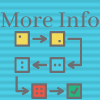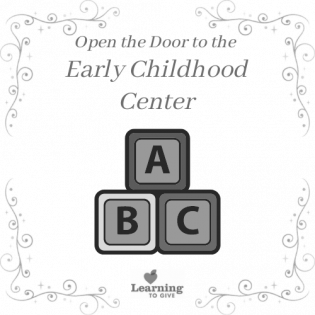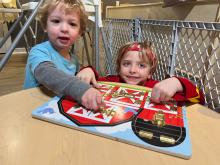Open the Door to the Early Childhood Care Center
The "Open Doors to Your Community" project is a virtual door that guides young people to the actual door of local resources so they can learn about their community, take action, and build connections and understanding of their roles in the community.
What Is the Purpose of an Early Childhood Care Center?
Providing the youngest children with good care gives them lifelong learning habits. The work of young children is to play and discover their world in a safe environment with loving caregivers and stimulating materials. They develop their creativity, thinking skills, and sense of community during these early years. An early childhood learning center is led by professional educators who understand how children learn and thrive for optimal development. Every community benefits from good quality early childhood development, which can occur in childcare facilities or in the child's home. Children who receive positive experiences to learn about themselves and their surroundings (social-emotional learning), grow to be productive members of any community.
Meet the Early Childhood Care Center Director
In this brief video, we meet Leta Bowman of Leta’s Educational Childcare and Learning Center from Ludington, Michigan. She shares why good care is important, what a center provides, and how young people can get started in an early childhood career through babysitting and volunteering at a center.
Contact Your Local Childcare Center
Look online for a center that cares for babies, toddlers, and preschoolers. It may be based in a faith-based organization, a government agency, or a private space. Call to set up a phone or in-person interview. Tell them you'd like to talk to the director to learn more about the work of the program so you can get involved or volunteer to help their mission. Ask for 30 minutes or an hour of their time. The Interview Script linked here and below can help you make the call.Interview Questions
These questions can help you learn about your community and ways you can get involved.
- What is the main purpose of the early childhood center? This may be its mission or vision.
- What are some challenges in the community that the center seeks to address?
- How does the early childhood center near you address those issues?
- What can a young person do to raise awareness of their work, raise funds, or volunteer at the center?
Take Action in Your Community
Reflect on the work of the preschool and early childhood programs in your community. What can you help them do? Your voice and time matter. The resources below can help you plan a project.
The best service-learning projects guide us to gain and use knowledge, are led by youth voice and passion, address a need, and develop connections with local resources over time.
 Learning to Give Issue Area Toolkits include background on the issue, community connections, lessons and activities, project ideas, and planning guides. Check out the Literacy toolkit. This Reading Tutor Guide provides tips for reading aloud to children.
Learning to Give Issue Area Toolkits include background on the issue, community connections, lessons and activities, project ideas, and planning guides. Check out the Literacy toolkit. This Reading Tutor Guide provides tips for reading aloud to children.
 Learning to Give Service Sparks guides provide directions for generous actions that encourage youth voice and promote the common good. Check out the Neighborhood Ladybug Hunt service project or the Boost Happiness with Art guide. Young people may volunteer to play with preschoolers or donate toys or books to a center.
Learning to Give Service Sparks guides provide directions for generous actions that encourage youth voice and promote the common good. Check out the Neighborhood Ladybug Hunt service project or the Boost Happiness with Art guide. Young people may volunteer to play with preschoolers or donate toys or books to a center.
 Learning to Give Literature guides combine selected literature with thought-provoking discussions and activities that teach about giving and civic engagement. Read aloud a picture book to a younger child or a retirement home buddy. This book Daniel's Good Day introduces readers to many people in the community. The book All Are Welcome inspires children to celebrate the diversity and gifts of all children. The book Not Your Typical Dragon shows there is not just one right path to learning and success.
Learning to Give Literature guides combine selected literature with thought-provoking discussions and activities that teach about giving and civic engagement. Read aloud a picture book to a younger child or a retirement home buddy. This book Daniel's Good Day introduces readers to many people in the community. The book All Are Welcome inspires children to celebrate the diversity and gifts of all children. The book Not Your Typical Dragon shows there is not just one right path to learning and success.
More about Early Childhood Learning
Fun Facts:
-
The brain develops most rapidly before birth and during the first two years of life. Good health, good nutrition, and nurturing care are important during this time.
-
Children are curious. There is an ongoing interaction between the child and their environment that affects the child’s development.
-
Children are the first scientists – Play gives children many opportunities to think and solve problems.
-
Copying the baby’s sounds and gestures starts a good communication game.
Service Project Ideas for Young People:
-
Read to children and ask them questions about the story. Talk about the illustrations as well.
-
Write books with children and let them illustrate their own stories.
-
Take a walk outside and observe nature. Ask questions that engage the five senses – What do you hear? What can you smell? How does this grass feel? Can you taste something? What animals or colors do you see?
-
Create coloring pages for small children to color or paint
-
Develop a survey for childcare facilities in your area to record the number of events of a designated action (smiles, hugs, canned food, water bottles, books) and observations about babies' moods and intellectual stimulus. Collect the data and make inferences about the impact of positive care and wellbeing.

